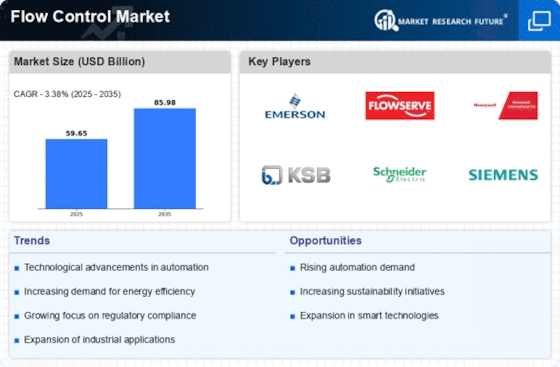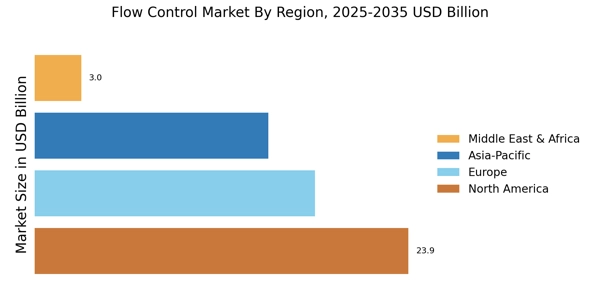Rising Demand for Automation
The Flow Control Market is experiencing a notable surge in demand for automation across various sectors. Industries such as manufacturing, oil and gas, and water treatment are increasingly adopting automated flow control systems to enhance efficiency and reduce operational costs. According to recent data, the automation segment is projected to grow at a compound annual growth rate of approximately 8% over the next five years. This trend is driven by the need for precision in operations and the ability to monitor processes in real-time. As companies strive for operational excellence, the integration of automated flow control solutions becomes essential, thereby propelling the growth of the Flow Control Market.
Expansion of Infrastructure Projects
The Flow Control Market is poised for growth due to the expansion of infrastructure projects worldwide. Governments and private entities are investing heavily in the development of transportation, energy, and water supply systems. For instance, the construction of new pipelines and water treatment facilities necessitates advanced flow control solutions to ensure optimal performance and safety. Recent estimates suggest that infrastructure spending could reach trillions of dollars in the coming years, creating substantial opportunities for flow control manufacturers. This expansion not only supports economic growth but also drives the demand for innovative flow control technologies, thereby enhancing the overall landscape of the Flow Control Market.
Increasing Focus on Energy Efficiency
The Flow Control Market is significantly influenced by the increasing focus on energy efficiency. As energy costs continue to rise, industries are seeking ways to optimize their operations and reduce waste. Flow control systems play a crucial role in managing energy consumption by regulating the flow of fluids and gases in various applications. Recent studies indicate that implementing advanced flow control technologies can lead to energy savings of up to 30%. This emphasis on energy efficiency aligns with global sustainability goals, prompting industries to invest in modern flow control solutions. Consequently, the demand for energy-efficient flow control systems is expected to drive growth in the Flow Control Market.
Regulatory Compliance and Safety Standards
The Flow Control Market is also driven by stringent regulatory compliance and safety standards across various sectors. Industries such as oil and gas, pharmaceuticals, and food and beverage are subject to rigorous regulations that mandate the use of reliable flow control systems to ensure safety and quality. Compliance with these regulations often requires the adoption of advanced flow control technologies that can provide accurate measurements and control. As regulatory bodies continue to enforce these standards, the demand for compliant flow control solutions is likely to increase. This trend not only enhances safety but also propels the growth of the Flow Control Market, as companies seek to meet and exceed regulatory requirements.
Technological Advancements in Flow Control Solutions
The Flow Control Market is witnessing rapid technological advancements that are reshaping the landscape of flow control solutions. Innovations such as smart sensors, IoT integration, and advanced materials are enhancing the performance and reliability of flow control systems. These technologies enable real-time monitoring and predictive maintenance, which can significantly reduce downtime and maintenance costs. As industries increasingly adopt these advanced solutions, the market for flow control technologies is projected to expand. Recent reports suggest that the adoption of smart flow control systems could increase by over 25% in the next few years, indicating a robust growth trajectory for the Flow Control Market.


















